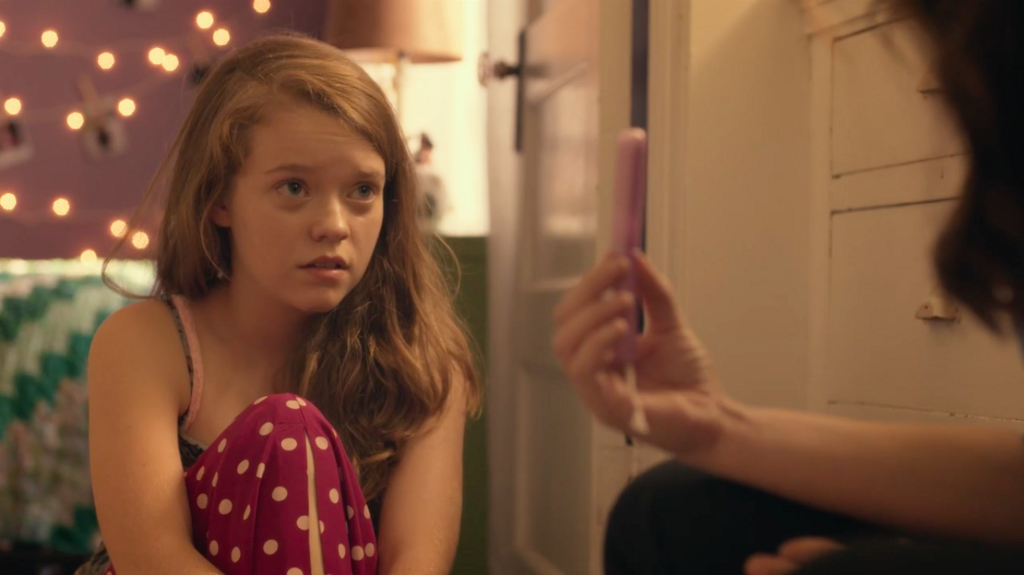Writer-director Dorie Barton makes her feature film debut with “Girl Flu.” She has spent many years as a story consultant with filmmakers, from up-and-coming writers, to industry veterans. As a professional actor, she has been seen in countless television shows, including daytime dramas, mutli-cam sitcoms, and major motion pictures such as “Down with Love” and “God Bless America.”
“Girl Flu.” will premiere at the 2016 LA Film Festival on June 6.
W&H: Describe the film for us in your own words.
DB: “Girl Flu.” is a sweet, funny, and terribly awkward coming-of-age story about a 12 year-old girl getting her first period. It cracks open her sense of herself, it throws off the delicate balance between her and her mom — who has managed to never grow up — and forces both mother and daughter to come to grips with what “becoming a woman” actually means to them.
W&H: What drew you to this story?
DB: I really felt like it was time for a story of what it’s like to get your first period to be given its whole own film. Not a dumb joke to gross people out. Not to humiliate and destroy someone. But a story that can shine some light and laughter on a real subject that rarely gets its due — but absolutely should. “Are you there, God? It’s Me, Margaret.” was written 46 years ago. It’s time.
W&H: What do you want people to think about when they are leaving the theater?
DB: I hope this film inspires some great conversations. Between women. Between parents and kids. I hope guys enjoy seeing the glimpse behind the curtain and learn a few things. Menstruation is a completely normal, everyday thing. It’s not something shameful that has to be hidden away, so we should stop hiding it. Now. It might be messy, but so is life.
W&H: What was the biggest challenge in making the film?
DB: My biggest personal challenge was being equal parts patient and persistent in getting this made. You can’t force something into being but you can’t just wait for it to happen either. Being graceful about both is an art in and of itself.
W&H: How did you get your film funded? Share some insights into how you got the film made.
DB: The film is financed through private equity. It was crucial to my producers and me to to make this film exactly how we wanted it to be made. Compromises have to be made all the time in filmmaking, but being able to make all of the major decisions with just a tight circle of collaborators was fantastic.
W&H: What’s the best and worst advice you’ve received?
DB: I read a huge amount of interviews with directors before I made this film. They’re full of advice, good and bad. Even bad advice is helpful because then you know what you don’t want to do — like that awful, infamous advice to fire someone on your first day to show everyone who’s boss. Terrible!
The best advice was gathered from reading all the interviews and realizing that everyone does this job differently, and that’s not only okay, it’s part of your job to do it your own way.
W&H: What advice do you have for other female directors?
DB: The job is the job; it doesn’t change depending on your gender. But how you do the job should be aligned with your innate personality and how you see the world.
As much as I admire them, it would be absurd if I tried to be Kathryn Bigelow or Clint Eastwood because I’m not them. Be who you are and trust your people to support you and your vision.
W&H: Name your favorite woman-directed film and why.
DB: One that I love is “American Psycho,” directed by Mary Harron. First and foremost, it’s a kick-ass movie. But it also creates an interesting conversation about perception. When you find out it’s directed by a woman, I think the first reaction is surprise. But why should that be surprising? It’s just a great film.
I think we still have some mis-perceptions about what kind of a film is a woman’s film and what women are good at. Preconceived notions are ridiculous, but fortunately they get blown up every time another woman makes a great movie.







